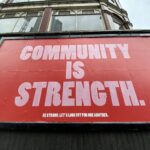I’ve been writing recently about how faith and values lead me to certain actions as a voting citizen of the US. This post shares some lessons and observations on this topic and raises some questions to consider. The September 10 Presidential debate made real one more time the difference between an anti-immigrant, fear-based message, and a message of hope and inclusion. There is a lot at stake this election.
I took a look at the basic rights and responsibilities of a U.S. citizen. The first right is to vote! And it is a responsibility along with “upholding the laws and Constitution.” It is not just the responsibility of our elected representatives to pay attention to how we uphold our laws and Constitution. It falls on all of us.
Since I think the beliefs and actions of Christian Nationalists threaten and violate our Constitution and laws, I feel moved to learn more and do what I can to be a Christian against Christian Nationalism.
Two different friends told me about huge billboards they saw that focused on the debate. One is on the main street of a waterfront town on Long Island, New York. A billboard, so huge you can’t miss it, states the ultimate Christian Nationalist belief: “In Trump we trust.” It reminds me of the long period in history when the Pope and the King were the same, or in coalition. It didn’t work so well!
The other billboard was spotted on the Pennsylvania Turnpike and states: “America is better than whatever this is” with an arrow pointing to a picture of Donald Trump.
Christian Nationalism has older and deeper roots than Donald Trump, and will not go away when he goes away. For that reason, opposing Christian Nationalism is important for both this election cycle and long term.
I am aided in discerning what to do about Christian Nationalism by our monthly Racial Justice Conversation (1st Wednesday at 5 p.m. Eastern – all welcome). Our recent focus was learning more about Christian Nationalism and sharing what actions we are taking to put our faith to work in protecting our Constitution and expressing our faith.
In terms of learning, we are relieved to discover that others find this a complex and mushy topic. And there are people of faith who are organized and taking a number of actions. Several members of our monthly discussion group found helpful the resources on Vote Common Good.
Sojourner’s Magazine is part of an ecumenical Christian media and advocacy organization that works for racial and social justice. For several years their magazine has covered Christian Nationalism and how people of faith can respond. Their current September/October issue focuses on this topic. The lead article is How Christians Can Counter Christian Nationalism, an exploration by scholars, pastors, and activists on hopeful actions to undo this heretical belief system.
While learning is important, we are reminded in many ways that faith without action is dead! Two concrete actions emerged from our September discussion. Both have application for the fight against Christian nationalism and for the broader effort to carry out our duty to vote and uphold the Constitution.
A simple one is to participate in Vote Forward’s nonpartisan letter writing campaign to encourage all to vote. Several friends are doing it. Go to www.voteforward.org. Look at options for where letter writing campaigns are needed. Select one and go to https://votefwd.org/instructions for step-by-step guide to get started. And if you prefer, you can give financially to support this campaign.
Another obvious and perhaps more challenging action is to talk with neighbors and friends about the upcoming election and voting. Tell them how your values inform your responsibility to vote. One member of our group, a Catholic priest, is planning to talk with a fellow priest whose positions appear quite contrary to Jesus’ teachings. He wants to better understand how his colleague comes to his conclusions and to see if, perhaps, there is an openness to dialogue. (Dialogue is different than discussion. Dialogue seeks to explore and learn and build connections. Discussions usually have a point of view and winners and losers.)
Another member realized her best outreach was to a friend who went to school with her. Her friend’s network is different than hers, and has more potential to expand the circle of engagement.
Vote Common Good offers suggestions and organized training on messaging and support for outreach. My recent post Who you gonna call? offers other examples of outreach. Governments and institutions are led by humans and will often disappoint us. Yet, they are how we come together as community. In community we influence how much joy and love we experience in our time here. We need all of us engaged to make our communities places of love and freedom.




0 Comments